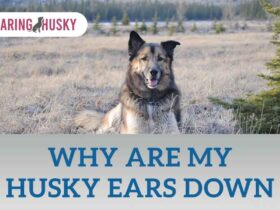Huskies, with their striking appearance and captivating personalities, have long held a special place in the hearts of dog enthusiasts worldwide. These Siberian natives are renowned for their sled-pulling prowess, endurance, and friendly demeanor. However, as the need for home security remains a top concern for many, the question arises: can Huskies be relied upon as effective guard dogs? In this article, we delve into the fascinating world of Huskies, exploring their unique characteristics, temperament, and the qualities that make a good guard dog. We’ll also address common misconceptions and offer insight into whether Huskies can genuinely stand as guardians of hearth and home.
Are Huskies Good Guard Dogs?
Huskies are generally not considered ideal guard dogs. Their friendly and social temperament may not suit the typical characteristics required of a guard dog. Although they can be alert and vocal, their primary nature is not protective. If you’re specifically looking for a guard dog, exploring breeds known for their protective instincts is advisable. On the other hand, Huskies excel in other roles as loyal companions and working dogs.
Evaluating Huskies As Guard Dogs
When evaluating Huskies as guard dogs, it’s essential to consider several factors that influence their suitability for this role:
Size and Strength:
Huskies are medium-sized dogs with a well-built physique. While they possess adequate strength, they are less physically imposing than larger breeds like German Shepherds or Rottweilers, commonly chosen for guard dog roles. The size and strength of a guard dog can be a crucial deterrent factor, as a giant dog can appear more intimidating to potential intruders.
Alertness and Intelligence:
Huskies are brilliant dogs with keen senses. They have a natural curiosity and are often alert to their surroundings. This alertness can make them effective watchdogs, as they quickly notice unusual sounds or movements. However, being alert and intelligent does not necessarily translate into aggressive guarding behavior.
Protective Instincts:
One of the critical qualities of an effective guard dog is a strong protective instinct. As a breed, Huskies are known for having fewer instincts, which are as strongly developed as breeds specifically bred for guarding, such as the Doberman Pinscher or Belgian Malinois. Huskies are generally friendly and pleasant and may not display the same level of territorial aggression or protective behavior.
Loyalty to the Owner and the Family:
Huskies are known for their loyalty to their owners and their families. They form strong bonds and often become deeply attached to their human companions. While this loyalty can be an asset in some guarding scenarios, it may translate into something other than aggressive protection. Huskies are likelier to see strangers as potential friends rather than immediate threats.
Training and Socialization:
Extensive training and socialization are imperative if you intend to use a Husky as a guard dog. Training should include obedience commands and specific guard-related behaviors. Socialization helps Huskies interact appropriately with strangers while still maintaining their friendly disposition. A Husky may only respond effectively to perceived threats with proper training and socialization.
Common Misconceptions:
Some people may mistakenly believe that Huskies, with their wolf-like appearance, are natural guard dogs. However, this misconception can lead to unrealistic expectations. It’s essential to understand that Huskies’ friendly nature is a fundamental aspect of their breed, and they are not predisposed to aggressive guarding behavior.
Real-Life Cases:
While Huskies are not traditional guard dogs, there have been instances where they have acted protectively and deterred potential intruders. These cases are exceptions rather than the rule and often involve Huskies who have received extensive training and socialization. These situations highlight the potential for individual variation within the breed.
Limitations And Potential Challenges In Using Huskies As Guard Dogs
Using Huskies as guard dogs comes with several limitations and potential challenges that owners should be aware of:
- Lack of Aggressive Nature:
One of the most significant limitations of Huskies as guard dogs is their inherent lack of aggression. Unlike breeds specifically bred for guarding, Huskies are known for their friendly and pleasant nature. Their primary disposition is affectionate and approachable, which is not conducive to guarding behavior. While they may alert you to potential threats, they are unlikely to confront intruders with the level of aggression needed for adequate protection.
- Overly Friendly Behavior:
Huskies have a natural inclination to be friendly, even to strangers. They often greet people with enthusiasm and are quick to make new friends. This can be challenging in a guarding role because they may need to discern between genuine visitors and potential threats. Their friendly demeanor may not serve as a deterrent to intruders.
- Independence and Stubbornness:
Huskies are known for their independent and sometimes stubborn nature. They tend to think for themselves and may not always obey commands without question. In a guarding scenario, obedience is crucial, ensuring the dog responds promptly and reliably to commands. The independent streak of the Huskies can make training more challenging and less predictable.
- High Energy Levels:
Huskies are an energetic breed known for their stamina and endurance. While their high energy levels can make them more alert and attentive, they may become restless during long periods of waiting or guarding. Keeping a Husky engaged and focused for extended periods can be demanding.
- Minimal Deterrence Factor:
While striking and unique, the appearance of Huskies may not be as intimidating as that of other breeds bred for guarding. Intruders may not perceive them as a severe threat, reducing the deterrence factor of having a guard dog on the premises. This means that Huskies may only deter potential threats partially through their presence.
- Socialization Challenges:
Training a Husky to distinguish between friendly visitors and potential threats can be challenging due to their inherently friendly disposition. Proper socialization and training are essential to ensure that a Husky can differentiate between everyday interactions and situations that require a protective response.
- Unpredictable Behavior:
While some individual Huskies may naturally display protective behavior, their responses can be unpredictable. Some may be overly passive, while others may be more assertive in guarding situations. This variability can make relying on them consistently as guard dogs challenging.
- Maintenance and Exercise Needs:
Huskies have substantial exercise requirements and need mental stimulation to remain happy and well-behaved. Failing to meet these needs can result in behavioral issues that could affect their effectiveness as guard dogs. Owners must commit to providing the necessary exercise and mental engagement.
- Cold Weather Preference:
Huskies are bred for cold climates and have thick double coats. They may become uncomfortable or less vigilant in hot weather, potentially impacting their effectiveness as guard dogs during warm seasons. Owners in hot climates should consider this limitation.
- Legal and Liability Issues:
Using a dog as a guard animal can have legal implications in some jurisdictions. Owners may be held liable for any injuries or accidents involving the dog. It’s essential to be aware of local laws and regulations regarding guard dogs and to take appropriate measures to mitigate liability.
Factors To Consider When Assessing A Husky’s Suitability As A Guard Dog
Assessing a Husky’s suitability as a guard dog involves considering various factors that influence their capability for guarding. Here are the key factors to evaluate:
- Temperament: Huskies are generally known for their friendly, outgoing, and sociable temperament. However, their temperaments can vary widely. Some Huskies may exhibit more assertive or protective behavior, while others may remain laid-back and carefree in the face of strangers. It’s crucial to assess the specific Husky’s temperament to gauge its suitability for guarding.
- Protective Instincts: While Huskies are not typically known for protective solid instincts, some individuals may develop protective behavior under certain circumstances. Assess the dog’s reactions to strangers or unusual noises. Look for signs of alertness, cautiousness, and a willingness to investigate potential threats. A Husky with heightened protective instincts may exhibit more vigilant behavior.
- Physical Characteristics: While Huskies are not as physically imposing as some other guard dog breeds, their appearance can still serve as a deterrent. Their striking features, wolf-like appearance, and piercing eyes can intimidate potential intruders. However, it’s important to note that relying solely on appearance for security is not advisable, and their behavior is more critical.
- Energy Levels and Stamina: Huskies are known for their high energy levels and endurance. They can remain active and alert for extended periods. Assess the Husky’s stamina and ability to maintain vigilance, which can be a valuable asset in guarding scenarios. Regular exercise and mental stimulation are essential to keep their energy in check.
- Health and Fitness: A healthy and fit Husky is likelier to perform effectively as a guard dog. Ensure the dog is in good health free from any physical ailments that may hinder its ability to carry out guarding duties. Regular veterinary check-ups and a balanced diet are essential for maintaining overall fitness.
- Home Environment: Evaluate the suitability of the Husky’s home environment for guarding. Factors such as the property’s layout, secure boundaries, and the level of activity in the area can impact their effectiveness as guard dogs. Adequate fencing and secure confinement areas are essential to prevent the dog from wandering.
- Legal and Liability Considerations: Be aware of local laws and regulations regarding the ownership and use of guard dogs. Some jurisdictions may have specific requirements and restrictions for owning and using dogs for security. Understanding your legal responsibilities and potential liabilities is crucial.
- Realistic Expectations: Maintain realistic expectations about what a Husky can provide regarding security. While they may not possess the same guarding instincts as breeds specifically for protection, they can still contribute to home security by providing alertness and warning of potential threats. Understanding their limitations is critical to making an informed decision.
Bottom Line
In conclusion, while Huskies are undeniably wonderful companions known for their loyalty and charm, they are not typically well-suited to the role of a traditional guard dog. Their friendly nature and independent spirit may make them less effective in guarding against potential threats. However, every dog is unique, and with the proper training and socialization, some Huskies can serve as watchful protectors in specific scenarios. Ultimately, the decision to have a Husky as a guard dog should be made carefully, considering individual needs, circumstances, and the importance of providing a loving home for these remarkable dogs.
FAQ’s
Will a husky protect you?
Huskies are known for their loyalty and may alert you to potential threats, but they are generally not natural protectors like some other breeds. While individual Huskies can display protective behavior, it’s not their primary instinct. If protection is a top priority, consider breeds with stronger guarding instincts.
Are huskies aggressive to intruders?
Huskies are not typically aggressive to intruders. They are friendly and social, often greeting strangers with curiosity rather than aggression. While they may bark or raise an alarm if they sense something unusual, they are not known for displaying aggressive guarding behavior.
Which is the best guard dog?
The best guard dog depends on your specific needs and circumstances. Breeds like German Shepherds, Doberman Pinschers, and Rottweilers are known for their strong guarding instincts. However, the ideal guard dog may also depend on factors like your living situation, training capability, and the level of protection required. Researching and choosing a breed that aligns with your specific requirements is essential.






Leave a Reply